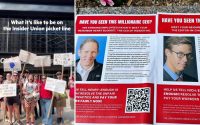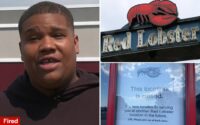Inside the weird, secret history of Chelsea Market
Chelsea Market is celebrating its 25th anniversary this month, but the High Line food emporium hasn’t always been a culinary mecca for upmarket foodies and chefs.
Chelsea Market is most famous for revitalizing a rundown section of the West Side. But in an exclusive interview with Side Dish, its 88-year-old founder Irwin Cohen revealed a wild ride that has included Russian money, ex-KGB security and a tie-up with US government agencies following the devastating terrorist attacks of 9/11.
In the early 1990s, the lifelong New Yorker cooked up the idea to open a food market that would combine wholesale and retail elements to promote local entrepreneurs and artisans. But Cohen didn’t have the money to make it happen because of a recession that had frozen bank loans.
So he turned to the free-flowing spigot of cash shooting out of Russia after the fall of the Soviet Union. Russian investors helped him snap up the assemblage of 17 buildings – spanning the city block between West 15th and West 16th streets, and book-ended by 10th Avenue and 11th Avenue – for just under $11 million.
The buildings were once home to the Nabisco Factory, maker of the Oreo cookie, but were now a collection of dilapidated structures infested with feral cats and “100 years of garbage,” Cohen said.


The site had also played host to a gruesome triple-murder in the late 1980s. Two men had been executed in the basement and a third man died from his wounds in what appeared to be a robbery.
Outside wasn’t any safer. The only booming business was prostitution on the otherwise deserted streets.
“It was a very very tough neighborhood,” Cohen said. “Going to work every day was a little dangerous. In fact, my Russian investors had to send over retired KGB agents.”
But flush with the Russian cash, Cohen and his daughter Cheryl implemented their idea of “having only wholesale food suppliers who would also then go into a small part” of the retail business.

It was a bold move for someone who didn’t know anything about the food industry. New Yorkers, he said, care about clothing, food and shelter.
Earlier in his career, Cohen had “lots of garment center tenants, so I didn’t want to build factories or showrooms, and I had also managed lots of apartments all over the United States, so we were left with food, and we all need it.”
The two focused on bringing in women entrepreneurs when Chelsea Market opened on Nov. 12, 1997. At the start, Cohen said, “67% of our owners were women.”
Those included Amy Scherber, of Amy’s Bread, and Sarabeth Levine, of Sarabeth’s.
The concept took off and so did the neighborhood as the city cracked down on crime to shed its seedy image.
Then came the Sept. 11 terrorist attacks. Cohen and his daughter quickly turned Chelsea Market into a staging point to coordinate food and supplies for first responders.
“We had vans and trucks going 24 hours a day with food and supplies from Chelsea Market down to Ground Zero, and we supplied most of the provisions for all the people who were working down there.” Cohen said.

As the rebuilding began, Cohen landed federal contracts to develop offices for vital government agencies after the Twin Towers fell.
“I was chosen to rebuild the intelligence operations that were destroyed on 9/11,” said Cohen, a son of immigrants from Russia and Poland who grew up in Brooklyn.
“We had the joint terrorist task force and organized crime and money laundering for the Drug Enforcement Administration, and various other operations,” he continued. “That was really the thrill of my life, to be able to work for the United States government.”
The Chelsea Market’s business model helped his tenants stay afloat in the aftermath of the attacks.

“When 9/11 occurred, our tenants told me that my idea of wholesale with retail was what saved their business lives, because people stopped going out to restaurants but they had good quality food…with good prices,” Cohen said.
By 2003, the ex-Soviet investors were out, Cohen said. Real estate firm Jamestown bought 75% of the business, said Michael Phillips, president of Jamestown, which is also behind Brooklyn’s Industry City and Ghirardelli Square in San Francisco.
In 2018, Google paid $2.4 billion to snap up the once-languishing property.
“I think that we did something good by getting the market started, and I was really privileged to be able to work with my daughter and come up with this whole idea,” Cohen said. “The fact that it has survived this long is really a credit to the people who live in New York City. They support it, and now we have something that has become the model for other similar organizations throughout the world.”


